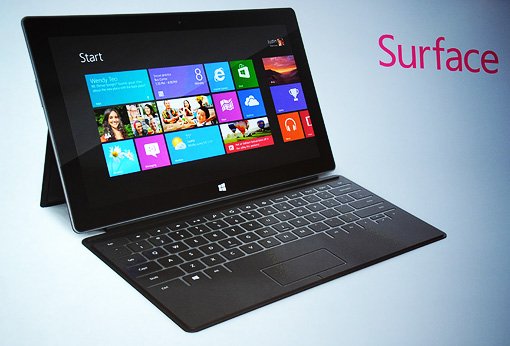
Microsoft has started shipping its first Surface tablet computers ahead of their official launch on October 26th.
According to Microsoft site, it has sold out of pre-orders for the 32GB version of the device, which runs the RT version of Windows 8.
It marks Microsoft’s entry into the PC hardware market, posing competition to other computer manufacturers.
Early reviews of the device have been mixed, praising the hardware but criticizing a lack of software.
Surface with Windows RT – to give the device its full name – runs on a chip made by Nvidia, based on the designs of British company Arm Holdings.
It is designed to be cheaper and offer longer battery life than products using x86 chips that run the full Windows 8 system.
The caveat is that Windows RT devices can only install third-party software from Microsoft’s own Windows Store.
Although they do offer a traditional desktop mode, the only programs that can be run under it are Microsoft’s Office 2013 suite and a limited number of the firm’s other products.
Until more third-party apps are developed for the touch-interface mode, users face a significantly smaller selection of software than they would on traditional Windows devices and tablets powered by Apple’s iOS or Google’s Android operating systems.
Microsoft intends to launch an Intel-based version of the Surface offering the full Windows 8 system in January.
But it does appear there is demand for the Windows RT.
Although Microsoft has not disclosed sales figures, it said that pre-orders of the 32GB version of the tablet – which costs $600 – had “temporarily sold out” in the US, Canada, France, Germany and the UK within a day of going on sale.
An $860 64GB version bundled with a Touch Cover keyboard remains on offer.
Reviewers have given a mixed reaction to the machine.
“This is one of the most of exciting pieces of hardware I’ve ever used,” enthused Wired’s Matthew Honan.
“It is extremely well-designed; meticulous even.”
He praised the ability to type quickly on the machine’s Type Cover – the $150 add-on that doubles as a keyboard and screen protector, offering an alternative to on-screen typing.
However, he criticized its cameras as “junk” and highlighted the lack of software.
“I missed apps like Dropbox and 1Password and Rdio,” he wrote.

The Wall Street Journal’s Walt Mossberg also commended the machine’s physical aspects.
“It’s a unique tablet, made of a type of magnesium with a feeling of quality and care,” he wrote.
However, he criticized its battery life, and highlighted problems with the third-party apps that were available.
“Evernote took a long time to synchronize my account, and the Kindle app had to stop every few pages to fetch the next section.”
The Verge’s Joshua Topolsky also complained some games felt “sluggish” on the machine, however he said Microsoft’s own Internet Explorer browser and Xbox Music apps showed “how playful and fresh this version of Windows can be”.
But Techcrunch’s Matt Burns decided that he could not recommend consumers buy the tablet in its current state, complaining that its 10.6 in (26.9 cm) size made it unwieldy.
“With its awkward size and incomplete operating system, the Surface fails to excel at anything particular in the way other tablets have,” he wrote.
However, he said it could offer an alternative to existing low-end laptops if Microsoft could attract more software developers.
“If properly nurtured, Windows RT and the Surface RT could be something worthwhile,” he said.
Microsoft’s chief executive Steve Ballmer may unveil more apps when he hosts an event to show off the tablets alongside the various versions of Windows 8 on Thursday in New York.
The devices and software will go on sale the next day.
Microsoft will face competition from Dell, Asus, Lenovo and Samsung, who have also unveiled Windows RT devices over recent weeks.
Apple is also attempting to woo consumers with its new iPad mini and revised fourth generation full-sized iPad, and Amazon has just launched its Android-powered Kindle Fire tablet family in the UK.
Google is also expected to unveil further Android tablets built by other manufacturers at an event on Monday, adding to the Nexus 7 it has already launched alongside Asus.
“It is really hard for consumers as the portfolio of products will be huge this Christmas season,” said Francisco Jeronimo, mobile device researcher at consultants IDC.
“Microsoft is trying to promote its entire eco-system – including its own Office software and the fact it can offer integration between Windows computers, Windows Phone handsets and the Xbox games console – to gain an edge.
“But it faces a huge problem as its rivals are offering cheaper-priced devices.”
Other analysts have noted, however, that Microsoft would risk angering other Windows 8 device makers were it to copy Amazon’s strategy of selling its tablets at break-even prices.
What is launching when:
24 Oct: Samsung (New York)
Will give details of US launch of Galaxy Note 2
25 Oct: Microsoft (New York)
Launch event for Windows 8 which goes on sale, alongside Surface tablets, the next day
29 Oct: Google (New York)
Android-themed event, may include new Nexus devices
29 Oct: Microsoft (San Francisco)
Launch of Windows Phone 8 operating system
30 Oct: Arm (London)
Mobile device chip designer and “partners” announce news